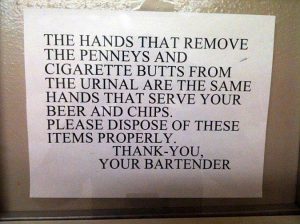The co-franchisee of a Carl’s Jr. in central Alberta was, according to Carolyn Dunn of CBC News, temporarily barred from his own restaurant’s kitchen after a host of unhygienic behaviours that even “shocked” a public health inspector.
 Jack Webb was captured on in-store security video at the Red Deer restaurant without gloves, forearm deep in a large container, mixing a batch of barbecue sauce for Carl’s Jr. burgers.
Jack Webb was captured on in-store security video at the Red Deer restaurant without gloves, forearm deep in a large container, mixing a batch of barbecue sauce for Carl’s Jr. burgers.
That was the first of no fewer than 10 food safety violations caught on video, which was exclusively obtained by CBC News.
Andrew Minnes, the former manager of the restaurant, blew the whistle on Webb to health authorities and CBC.
“I’ve never seen anything like this. If he wasn’t an owner, he would have been fired instantly. There wouldn’t even have been a debate,” Minnes told CBC News from his home in Airdrie, Alta.
Minnes says it was conscientious kitchen staff who initially alerted him to the “gross” infractions.
He says he approached Webb about the complaints.
“His reaction was, ‘I’m the owner’ and then ‘Too bad.’ He made it clear to the staff as well that they don’t say anything, ‘Don’t talk about what I’m doing, I do what I feel like doing.'”
So Minnes began playing undercover detective in the restaurant he managed until May 2017, recording the screen of the CCTV that overlooked the kitchen.
Minnes says he never planned to take the footage public — he just wanted to show it to the other co-franchisee so the issue would be addressed.
“He just ignored me. He didn’t want to deal with it. ‘Complicit,’ I guess is the word.”
Minnes had surreptitiously captured 10 videos of serious food safety regulation infractions on his cellphone.
During the barbecue sauce mixing video, a staffer goes as far as offering Webb a spoon — which his boss refuses and continues mixing with his hand and forearm, before scraping the accumulated barbecue sauce off his arm back into the container.
Domenic Pedulla, the CEO at the Canada Food Safety Group, shook his head while watching the video clips. “Bare hand contact with ready to eat food is not OK. This is where we want to use tongs, gloves.”
Webb didn’t use tongs or gloves in any of the videos.
CBC News approached Webb for comment at his Red Deer restaurant. He asked us to wait for an interview for several hours.
“We’re going to give a response,” Webb assured the CBC.
In the end, the response came via a statement from Carl’s Jr. Canada, which said it found out about the infractions in April and the video earlier this month.
The popular U.S. fast food restaurant, which has been trying to expand its franchise footprint in Canada since 2011 called the “improper food handling behaviour … unacceptable and (that it) in no way, represents Carl’s Jr.’s commitment to safe food handling.”
Carly McKinnon, who owns the Press’d The Sandwich Company franchise next to Carl’s Jr., told Paul Cowley of the Red Deer Advocate she used the CBC-obtained video showing food safety violations at Carl’s as a training exercise.
“I showed it. (I said) this is what happens. People are always watching,” said McKinnon, who also owns a Press’d franchise in Leduc.
“I’m sharing it with my staff. I just want to make sure they’re stepping it up.”
McKinnon said new employees are always given extensive training in food safety before they begin their jobs.
 Pastry Art Design Pty Ltd is the proprietor company of a registered food business at 280 – 282 Smith Street, Collingwood called Milk Jamm, previously known as Pastry Art Design. Emmanuel Ploumidis was the sole director of the company.
Pastry Art Design Pty Ltd is the proprietor company of a registered food business at 280 – 282 Smith Street, Collingwood called Milk Jamm, previously known as Pastry Art Design. Emmanuel Ploumidis was the sole director of the company.









